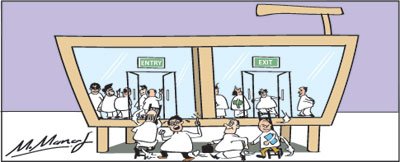Sunday Times 2
Once they get the taste of power
View(s):There is an apt Sinhala saying “Raha vatunama, aththarinnay-nam nae” which loosely translated means that once somebody gets a taste of something good, they will be extremely loth to give it up. I am now eighty years old, and I must admit that as I have got older I have become more cynical and less baffled by the sort of bovine faecal matter that is spouted by our sanctimonious politicians.
 The dominant political culture in our country – and I am sure it is the same in many other countries that call themselves democracies – is that the principal aim of politicians is to remain in power and to enjoy the benefits of office for as long as possible. Rather than serving the people and keeping the national interest uppermost, the paramaarthaya of parliamentarians seems to be to successfully survive the electoral process — and then pursue their own political progress and personal prosperity. This prime objective is often achieved by changing party colours to whatever hue is the order of the day and bearing subservient torches to whichever leader is popular at the time.
The dominant political culture in our country – and I am sure it is the same in many other countries that call themselves democracies – is that the principal aim of politicians is to remain in power and to enjoy the benefits of office for as long as possible. Rather than serving the people and keeping the national interest uppermost, the paramaarthaya of parliamentarians seems to be to successfully survive the electoral process — and then pursue their own political progress and personal prosperity. This prime objective is often achieved by changing party colours to whatever hue is the order of the day and bearing subservient torches to whichever leader is popular at the time.
When our present president was elected to office with the support of our present prime minister, they both made many promises to us gullible voters, and we voted them in. Unfortunately, in order for them to feel confident and secure, they needed the support of other politicians – so even those candidates who sought a mandate from the people and were rejected by the voters were squeezed into parliament through the back door by being appointed through the national list. Politicians who had previously been vociferous in denouncing Maithripala Sirisena and Ranil Wickremesinghe were persuaded to join them and support their government – and were rewarded with ministries.
 Despite the president talking about appointing a new cabinet on a “scientific basis” (does he mean to tell us that appointments to the previous cabinet were made on some other basis?) we voters are well aware of the criteria used to select cabinet ministers.
Despite the president talking about appointing a new cabinet on a “scientific basis” (does he mean to tell us that appointments to the previous cabinet were made on some other basis?) we voters are well aware of the criteria used to select cabinet ministers.
It is a well-known fact that almost all politicians want to become MPs, almost all MPs want to become ministers and almost all ministers want to become ministers in charge of big ministries. It is much more useful to be a minister in charge of a portfolio like highways (which controls road development projects involving billions of rupees) or industries (where one has responsibility for approving important licences and contracts) than to be minister in charge of a low budget operation like Buddha sasana or cultural affairs.
Being appointed a minister rewards the appointee with perks, privileges, petrol, publicity and personal staff. So being able to appoint ministers is a powerful asset that the president of our country has. He can reward supporters or assure himself of the loyalty of wavering MPs (of course, only until they decide to change sides yet again!)
This month the prime minister has to reward those members of the UNP who campaigned for him when he was faced with the recent no confidence motion – while the president has to persuade those who might desert him to stay with him.
It is an interesting fact that Russia, which has a population of 144 million has a cabinet of 17, China which has a population of 1,380 million has a total of 26 ministries – while Sri Lanka with a population of 21 million had until the end of last month 47 cabinet ministers and 45 “other” ministers!
As I said at the beginning, once our ministers get a taste of the perks of ministerial office, they are loath to let these go – so I am sure that if they wait patiently enough and offer their support to the correct people, it won’t be long before those who “resigned” for various reasons will find themselves back in office with all the perks, privileges, petrol and publicity to which they became accustomed.
Our current minister of foreign affairs is actually the former minister of defence who resigned in November 2015 and was portfolio-less for 17 months. The former minister of finance who resigned because of his close association with those accused of perpetrating a bond scam of gigantic proportions on our people is still hanging round like a bad smell, obsequiously holding torches to the prime minister, obviously waiting until he can be appointed again. And the thick-skinned gang of sixteen must be licking their wounds and biding their time until someone in power decides they are useful enough to be rewarded once again with portfolios.
And in the midst of all this we the voters can only suffer in silence.

